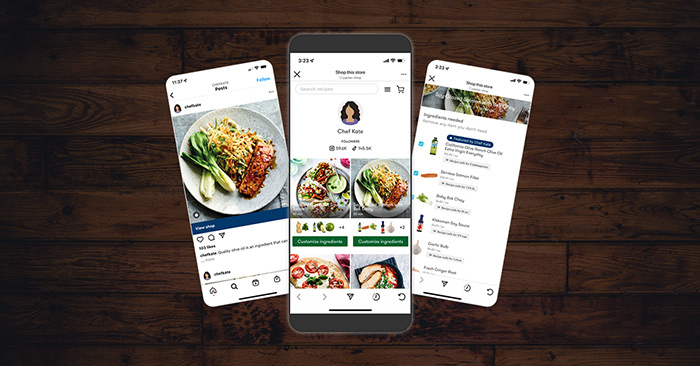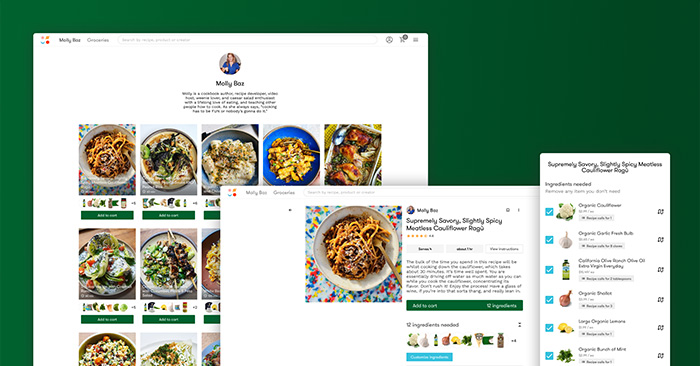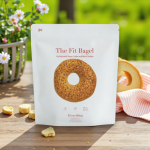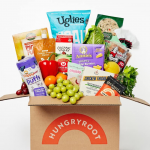Jupiter Creates Social Commerce Opportunities for CPG, Turns Influencers’ Content into Shoppable Recipes

Jupiter, a “creator-first” recipe and grocery shopping platform that launched this week, believes it can serve as the catalyst for social media food influencers to turn their content into shoppable recipes for at-home cooks nationwide.
Founded in 2019, the California-based startup began as a $45 per month subscription-based grocery delivery and meal-planning service, partnering directly with food producers and maintaining its own central warehouse where orders were fulfilled. However, with the direct-to-consumer model unsustainable due to headwinds such as rising inflation and Apple’s revised iOS policies, co-founder and CEO Chad Munroe said, the brand was forced to rethink its strategy.
During the height of the pandemic, Munroe said he witnessed the “explosive growth” in consumers cooking at home and a rise in viral food trends on TikTok and Instagram. For its second iteration, Jupiter has dropped its subscription fees and switched its approach to focus on creators and food brands, rather than grocery shoppers, as the brand’s core customer.
“[With Jupiter], each creator owns their own stilts, their storefront, the products that are in their recipes. It’s really built as an asset for creators to increase the value of their platform,” said Munroe.
According to data from Oracle, 80% of consumers have purchased products in direct response to social media content and 37% of consumers trust social media influencers over brands. Gen Z and millennials are two times more likely than Boomers to trust influencers.
After partnering with Jupiter, food content creators – dubbed co-pilots – launch storefront pages integrated with Instagram, TikTok and Instagram, allowing them to receive direct compensation from groceries shopped through their recipes, build ongoing relationships with brands and open multiple revenue streams. At launch, the platform had 60 creator storefronts. Unlike other platforms, which only work with influencers with higher follower counts, Jupiter plans to work (and compensate) micro-influencers as well.

The newly relaunched platform also provides opportunities for CPG brands to be featured in creators’ storefronts and multi-storefront promotions. For example, a creator may work directly with a brand to feature a recipe made with specific products or a brand can partner with Jupiter to run a campaign across all storefronts at once. The site currently has one featured brand at launch, with several more in the pipeline.
“The way we’re trying to help brands is to be able to quantify the impact of social media influencer marketing and be able to show those basket building metrics and those consumer insights they’re looking for, as well as the traditional brand awareness you get with creators,” said Munroe.
Though Jupiter’s model has changed since its inception, a common thread remains: putting groceries on “autopilot.” According to a press release, the company creates an “insanely easy” and convenient shopping experience by tracking consumers’ preferences over time.
After creating a free profile on Jupiter, consumers fill out an onboarding survey regarding their specific needs and lifestyle. Every week they receive a “smart shopping” plan that they can review and update based on their favorite recipes or creators.
“We believe that grocery will evolve to become more entertaining, more fun,” said Munroe. “And the only way it becomes more fun and hits that next evolution is if the hard things are removed from the process.
Jupiter is not the only player in the shoppable content arena. Earlier this year, Instacart unveiled a product integration feature allowing social media content creators to link their recipes directly to grocery items within the app. The feature – dubbed Shoppable Recipes – is currently available on TikTok and Tasty.
There’s a reason why companies — and investors — are interested in this commerce model. Jupiter, for example, has raised $8 million in funding from investors including Khosla Ventures, NFX and Michael Seibel, co-founder of live streaming service Twitch. As of 2022, the value of social commerce sales is estimated to be $958 billion, according to Influencer Marketing Hub’s State of Influencer Marketing benchmark report. By 2025, social commerce is projected to account for 17% of all ecommerce spending.
In the short-term, Jupiter hopes to reach 500 creator storefronts and 30 featured CPG brands by December. In the long-term, the platform plans to go global. One of the creators at launch, New York-based Molly Baz, also has a large following in the UK and Europe, with international consumers already attempting to order groceries from her recipes through the app.
“Ultimately, we serve the creator. So we have to be able to fulfill those orders and fulfill that demand,” said Munroe. “And so eventually, one of the things you’ll see from us is a big push to launch internationally.”

















